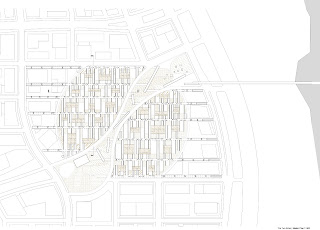GSD option studio: Common Framework
Instructor: Christopher Lee, Simon White(TA)
project name: the Two Sides ( and One Common Frame Work)
Site: Xiamen, China
This project is perhaps the hardest one I've ever done. Instead of an academic school project, I considered it more of a self-dialogue that forced me bouncing between rationality, emotion, and personal political stand. As being a Taiwanese, the given topic of a "cross-strait financial district" is way too sophisticated than an architectural design. Given the fact that interactions between China and Taiwan are becoming more often, it is essential not to let the economic interests over-shadowing the political stands, since economics is never free from politics. Under any circumstance, the sovereignty of the nation and the independence of government should be kept unharmed. Only based on this 'conditional harmony'can we then talk about the 'cooperation'.
Instructor: Christopher Lee, Simon White(TA)
project name: the Two Sides ( and One Common Frame Work)
Site: Xiamen, China
This project is perhaps the hardest one I've ever done. Instead of an academic school project, I considered it more of a self-dialogue that forced me bouncing between rationality, emotion, and personal political stand. As being a Taiwanese, the given topic of a "cross-strait financial district" is way too sophisticated than an architectural design. Given the fact that interactions between China and Taiwan are becoming more often, it is essential not to let the economic interests over-shadowing the political stands, since economics is never free from politics. Under any circumstance, the sovereignty of the nation and the independence of government should be kept unharmed. Only based on this 'conditional harmony'can we then talk about the 'cooperation'.
[Summary]
The project is
situated in the CBD site of east Xiamen. Architecturally, it rethinks the space
for mixing working, living, and cooperation through manipulating the urban
dominant type- Qilou. From the social point of view, the project is also the
manifestation of the political circumstance between Xiamen (China) and Kinmen
(Taiwan).
The original park
proposed by HOK cuts the site into two halves. As the interpretation of shop
houses in macro scale, two rolls of residential bars, which situated in between
HOK buildings from each side, stretched inward and divided existing fabric into
different urban pockets, leaving a large void space on ground level. The
circular shape of the void area creates a superficial symbol of unification.
The office units are scattered in the circular void area. Each office unit
consists of an exterior space, a transitional corridor space, an interior
space, and a shared space in the back. This is another interpretation of the
shop house.
Considering the issue
of Cross-Strait cooperation, the project argues against the sameness of
conventional CBD and the notion of unification. Though its architecture creates
an absolute and trans-scaling generic common framework for the entire site, the
use of different landscape and variations in accessibility creates a softness
and programmatic difference between the
two sides. Within the common framework, the two sides interact. Yet through
acknowledging and respecting the differences, the two sides gain benefits
without decreasing their own values. That is the essence of cooperation.











沒有留言:
張貼留言